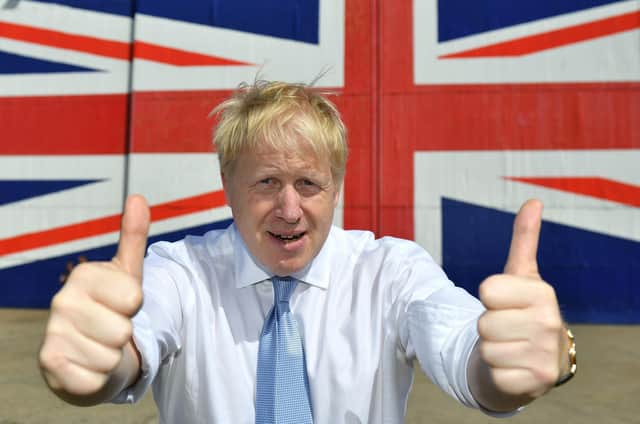Northern Ireland Protocol: UK-EU row shows how Boris Johnson has abandoned subtle Conservatism for reactionary nationalism – Joyce McMillan


It was a life-changing visit in many ways; and one of the first things I noticed, as I watched the Commission take evidence in the nationalist Falls Road and in the loyalist Shankill, was how the civic process was encouraging the emergence of a new language around peace in Northern Ireland, involving phrases like “parity of esteem” between Northern Ireland’s two main communities.
“Unity in diversity” was another buzz-phrase of the time; and the Good Friday Agreement of 1998, when it came, therefore fully recognised the dual character of Northern Ireland, by instituting a form of power-sharing that – despite some weaknesses – absolutely required mutual recognition and co-working between the two major traditions; and in the context of UK and Irish membership of the European Union, the whole settlement was profoundly supported by the EU, which itself thrives on principles of consent, and of unity in practical co-operation, despite immense diversity.
Advertisement
Hide AdAdvertisement
Hide AdIt’s therefore perhaps not surprising that the Conservative-led governments in power in the UK since 2010 have, by and large, completely failed to understand the basis of modern Northern Irish politics, or the extent to which the Brexit project is fundamentally incompatible with the UK’s previous commitments in the province.
The first mistake, of course, was made by David Cameron, who – under pressure from UKIP – took the cowardly decision to promise an EU referendum in his 2015 general election manifesto, without even talking to the Irish government, our partners in guaranteeing the Good Friday Agreement, about the likely impact on Northern Ireland of any possible Leave vote.
Then there was the referendum itself, conducted with scant regard for the proper democratic running of such elections; and after the shock victory of the Leave campaign, at least in England and Wales, the agonising premiership of Theresa May, a former Remain supporter who did not enjoy the trust of the “hard Brexit” boot-boys on the Conservative back benches, even when, after the 2017 general election, she concluded an ill-advised deal with hard Brexit-supporting Northern Irish party the DUP that trampled over the views of Northern Ireland’s Remain-voting majority.
Theresa May eventually thought her way through the Brexit conundrum, and concluded – rightly – that the whole UK would have to remain in the EU Customs Union, in order to maintain open borders both on the island of Ireland and in the Irish Sea; but her insight was rejected with derision by elements on the Tory back benches.
And in July 2019 she was replaced by Boris Johnson, the opportunist par excellence, the man without principles who was prepared to ride the tiger of extreme Tory hard-Brexit nationalism in order to reach Downing Street.
To “get Brexit done”, he signed a Withdrawal Agreement with the status of an international treaty, that involved a Northern Ireland Protocol instituting customs checks in the Irish Sea, then started to deny and misrepresent the implications of the agreement within hours of signing it.
Since that moment, in late 2019, Britain’s attempt to Brexit has become a litany of transitional arrangements and delays, with even arch-Brexiteer Jacob Rees-Mogg compelled to acknowledge the “self-harm” involved in disrupting trade relations with our 27 nearest neighbours.
More than two years on, we find a large pro-Protocol majority winning 52 of the 90 seats in last week’s Northern Ireland Assembly election; while the British government remains hopelessly wedded to the anti-Protocol DUP, which has just, in a historic moment, lost its status as the largest Assembly party to Sinn Fein.
Advertisement
Hide AdAdvertisement
Hide AdAnd now, the UK Government has chosen this moment to start to play “EU trade war” games for the benefit of the reactionary elements of British public opinion, aligning itself with the wreckers of the DUP and militant loyalism by threatening unilaterally to suspend its own Protocol, which is in fact already substantially benefiting Northern Ireland’s economy.
What the recent story of Northern Ireland reveals, in other words, is the utter decay of a once relatively subtle UK Conservative political tradition into a form of reactionary nationalism – deeply wedded to a creaking 19th century political system – that, among other problems, leaves it profoundly incapable of understanding the major processes of political change that have taken place in both parts of Ireland, in Scotland and increasingly in Wales, over the last 30 years; so much so that the picture of UK unity Boris Johnson now seeks to present to the world, on his travels to Ukraine and elsewhere, is in fact profoundly compromised, after 12 years of government by a party which sees its Westminster majority, achieved through an increasingly discredited electoral system, as a licence to trample over the diversity of the UK in every way – geographically, institutionally and politically.
When Sinn Fein emerged as the largest party in last week’s Stormont election, the British media were briefly excited by the possibility – still a distant one – that this might lead to a border poll, and the beginning of the formal break-up of the UK.
The truth about the UK, though, is that it is already fragmenting, at the fundamental level where people begin to reject a system of government that is no longer fit for purpose.
A government that genuinely strives to achieve unity in diversity is a blessing at any level, in other words. But a government that only wants unity in its own image, complete with ideological, institutional and cultural compliance – well, that kind of government is eventually doomed; not only in Northern Ireland, but across the UK, and far beyond.
Comments
Want to join the conversation? Please or to comment on this article.

